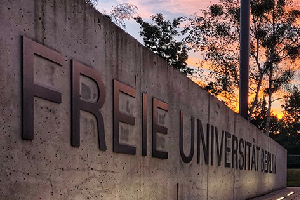Kaiserswerther Str. 16-18, 14195 Berlin, Germany
Career Counselling

Freie Universitaet Berlin is a public research University located in the largest city of Germany. It has constantly been ranked among the top five universities in the country, despite being much younger than the other major institutions of higher education. It is home to almost 38,000 students, of whom approximately a quarter come from outside Germany.
The academic organizational structure of FU Berlin contains 11 Departments (Biology, Chemistry & Pharmacy, Earth Sciences, Education & Psychology, History & Cultural Studies, Law, Mathematic...
| Establishment year | 1948 |
| Total Students | 37,500 |
| International Students | 8,555 |
| QS World University Rankings 2024 | 98 |
| Campus Size | N/A |
| Total Number of Campuses | 4 |
| University Website | https://www.fu-berlin.de/en/index.html |
| No. of Schools and Divisions | 11 Academic Departments |
| Nobel Prize Winner Alumni | 5 (including Professors) |
| No. of Education Programs | 78 (undergraduate), 95 (Master’s), 51 (PhD) |
| Student to Faculty ratio | 8:1 |
Freie Universitaet Berlin offers undergraduate and postgraduate courses through 11 Departments, which are further subdivided into Institutes.
There are many other Academic Divisions within the University, including four Central Institutes (including the John F Kennedy Institute for North American Studies), six Graduate Schools (for example, the world famous Berlin Mathematical School), and several Interdisciplinary Centers and Excellence Clusters.
Students who are applying to FU Berlin for an undergraduate program must have a valid Year 12 School Leaving certificate. Depending on the country of origin of the applicant, this certificate may further have to be notarized by the German Embassy in that country. Applicants to Master’s and Doctoral courses must have valid undergraduate and Master’s degrees, respectively. In case the applicant is in the final year of study towards such a degree at the time of application, interim certificates and transcripts can be submitted, with the understanding that the final documents have to be verified in person before admission is confirmed.
The second major entry requirement is language proficiency. Irrespective of the language in which the chosen program is taught, some level of German skills are needed. Most degree programs require C1 Level proficiency in German, though a few Master’s programs (where the medium of instruction is English) require only A1 level. The most common test taken is the DSH-1 examination. Programs which are taught in English have a variable level of language skills needed; details can be found on the course webpages. Most require a score of at least 4.0 on the IELTS, or at least 71 on the TOEFL iBT. Other test scores are also accepted, including Cambridge, Pearson, and UNIcert.
International applicants to FU Berlin (both undergraduate and postgraduate) must use the uni-assist portal to submit their applications. The following steps must be completed during the admission process:
The Admissions Office of FU Berlin responds to selected candidates within a few weeks of application submission. After the first semester registration and student fees are paid, the enrollment is confirmed, and the student can use this letter to apply for a German long term student visa. After reaching Berlin, he or she can apply for a residence permit after having all original documents verified at the University.
FU Berlin, being a German State University, does not charge tuition fees (except for some graduate continuing education programs). A total of 312.89 Euros are to be paid every semester towards various administrative costs:
These fees are applicable to all undergraduate and Master’s students; Doctoral program fees are even lower, at approximately 240 Euros per semester. The University recommends that students budget 934 Euros per month towards living costs. This is based on the amount required to be shown to the city authorities while applying for a residence permit. Private housing in Berlin (a single room in a shared apartment) has a rent of 500 Euros per month, on average. Food costs between 200 and 300 Euros per month. Other costs, including transportation and shopping, are heavily subsidized by student passes and access to low cost shops on campus; a total of 100 Euros can be set aside on a monthly basis towards other living costs.

Freie Universitaet Berlin has four campuses: Dahlem, Lankwitz, Düppel, and Benjamin Franklin. Dahlem is home to most of the Humanities, Social Sciences, and Cultural Departments. It also has a 106 acre Botanical Garden. Lankwitz houses the Geography and Geology Faculties. Düppel is home to the 15 Institutes of the Veterinary Medicine Faculty. The Benjamin Franklin Campus hosts the University Hospital across four locations, jointly managed with Humboldt University.
UniSport is the apex organization that organizes sports activities at FU Berlin. From social events like the Campus Run and the annual Summer Party to inter-University sports fixtures, it trains students and works with coaches to ensure that all members of the FU community can stay active and fit. The Center for Recreational Sports is home to world class venues and fitness equipment; students can visit gyms on a daily basis, or hire indoor halls or external grounds to play their favorite sport with like-minded friends.

The FU Berlin Student Union is the umbrella organization for all the clubs on campus. Many of these are active in the arts and cultural space, with the prominent Collegium Musicum organizing classical music nights, and working with some of the most famous orchestra musicians in Berlin to give students access to low cost cultural evenings at a reasonable price. Other student clubs allow theater enthusiasts, budding writers, journalists, and dancers the opportunity to hone their extracurricular skills in a safe space. Funding for student groups and access to performance venues is primarily provided by the University.
The main scholarship that is open to all international students, both undergraduate and postgraduate, at FU Berlin is the Deutschland Stipendium. This is associated with an award amount of 300 Euros per month, 50% of which is paid by the German Government, with the balance being paid by corporate sponsors. Students are selected based on academic merit and future potential. The scholarship is normally awarded for a period of one year, starting with the winter semester, with extensions being granted in cases of exceptional excellence or financial need. Applications are to be submitted in August and September every year, with results announced by the end of December.
Exceptional postgraduate students (both domestic and international) are eligible for the Test Scholarships for International Candidates. Rather than the students applying directly, professors must apply on their behalf. Awardees are paid an amount of 1,300 Euros for up to three months, in addition to a travel allowance so that they can attend important research events.
The Federal Training Assistance Act provides scholarships to FU Berlin students based primarily on financial need. Applications for these scholarships must be submitted directly to the social counseling department of the Education Department of Berlin. The amount of scholarship varies, and is defined by the level of financial need and quality of the letters of recommendation submitted.
